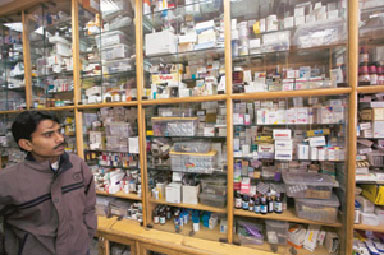|
WEDNESDAY, NOVEMBER 12, 2008 10:35 AM IST Govt set to tighten grip on makers of fake drug The punishment has now been raised to a minimum of 10 years’ imprisonment and a Rs10 lakh fine Radhieka Pandeya New Delhi: Parliament approved a long-pending amendment to the country’s main drugs law last month seeking stricter punishment of up to life imprisonment and fine of at least Rs10 lakh on those involved in production and trade of spurious drugs.
 But with an inadequate number of drug inspectors and obsolete testing laboratories, experts say the government will continue to be hampered in its ability to catch offenders and prosecute them.
Watch out: A chemist shop in New Delhi. A study conducted by the International Pharmaceutical Federation for the World Health Organization concluded 3.1% of all drugs in India were counterfeit. Rajeev Dabral / Mint.
On 21 October, the Rajya Sabha approved the amendment Bill to the Drugs and Cosmetics Act, 1956, that makes the offences related to fake and counterfeit drugs non-bailable for up to 90 days, and raises the punishment from a minimum of five years imprisonment to 10 years and sets a maximum sentence of life imprisonment. Fines were raised from Rs10,000 to Rs10 lakh, or three times the value of drugs confiscated, whichever is higher.
The Bill was then passed by the Lok Sabha on 23 October. It now requires President Pratibha Patil’s assent before it becomes a law.
The amendment Bill has been pending Parliament’s approval for five years. It was introduced in the Lok Sabha in December 2003 by the National Democratic Alliance government but could not be approved before that administration’s term ended.
It was then introduced in the Rajya Sabha in 2005 and referred to a parliamentary committee. The new Bill kept out the death penalty for those manufacturing and selling spurious drugs that could cause death.
Prafull D. Sheth, vice-president of the International Pharmaceutical Federation (FIP), an international drugs think tank, called the delayed approval of the Bill a big milestone in the history of Indian pharmaceuticals. “It used to be an embarrassment for us that punishment for selling and manufacturing spurious drugs was not only non-cognizable but also bailable. The fine was also merely Rs10,000,” said Sheth. “It showed that India was not bothered about the harm to consumers who unknowingly bought these spurious medicines.”
A non-cognizable offence is one under which an arrest could be made only under a warrant issued by a court.
A study FIP conducted for the World Health Organization concluded 3.1% of drugs in India were counterfeit—defined such even if only the packing and not the ingredients of the drug was fake—in line with global averages. Other studies earlier had pegged the estimate up to 30%. The FIP study also found most of the copied drugs belong to the anti-infective category.
But with as few as 35 drug inspectors last year, the Union government looks ill-equipped to catch offenders and mete out punishment even if the country’s drug quality regulator’s plans to recruit more are successful.
“We are in the process of recruiting 94 drug inspectors, of which 62 posts of drug inspectors and 10 of technical officers have already been sanctioned by the ministry,” says Surinder Singh, the drugs controller general of India (DCGI).
India’s large drug makers welcomed the penalties, but small and medium-sized manufacturers are worried over what they describe as the government’s obsolete regulatory machinery.
“The drug inspectors and researchers don’t have much knowledge, training or experience to sample drugs and are capable of failing even a passing sample,” said P.K. Gupta, co-chairman, Confederation of Indian Pharmaceutical Industry. “There could be an accident, especially during testing by the government since most of the state-run laboratories don’t have the required infrastructure. Of the 17 government laboratories for drug testing, only seven have reasonable infrastructure.”
DCGI officials and state drug controllers reject the charge. Gupta also said since the Bill does not specifically define a substandard drug, the manufacturer of such a drug could be charged for producing an adulterated or spurious drug and end up in jail for months.
FIP’s Sheth disagreed. “The Centre will not do everything and one shouldn’t expect it to either. The police and the judiciary will also be involved in prosecuting manufacturers. I don’t see innocent manufacturers getting caught because with the drug inspectors being overworked already, the government plans to also identify and appoint outside agencies to conduct studies,” he said.
Drug administrators in the states said they were looking forward to the President’s approval to the amendment. With the offence becoming cognizable and non-bailable, state drug controllers would no longer have to wait for years to prosecute an offender, they said.
Earlier, offenders had to be prosecuted using supporting Acts such as patent infringement and fraud, but now “we won’t need these any longer,” said D.K. Shringi, drug controller of Rajasthan. The Bill has also authorized state governments to empower gazetted officers as well as the police to prosecute the offenders.
|